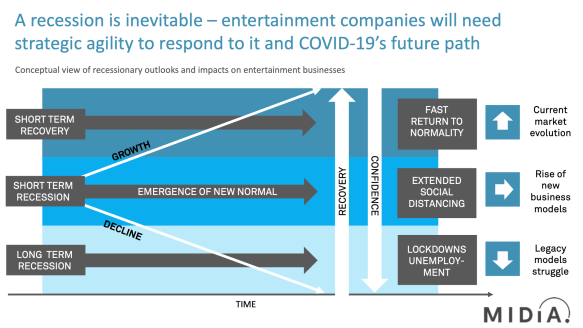(Hypebot) — Music and entertainment industry analysts MIDiA look at what the post-lockdown era will look like, new market and audience fundamentals and the resulting risks and opportunities.
By Mark Mulligan of MIDiA and the Music Industry Blog
COVID-19 social distancing measures caused unprecedented dislocation to the entertainment economy. With a recession now a question of ‘how bad’ rather than ‘if’, entertainment companies have to adapt their businesses and identify new partners to maximize opportunities in the post-lockdown era. This requires a detailed understanding of how the underlying user need states of their customers changed during lockdown, how these changes will in turn evolve, and how they can meet this new demand.
To help entertainment businesses and creators understand these dynamics and navigate the choppy waters ahead, MIDiA Research has created a new research stream entitled Recovery Economics. Recovery Economics explains what the post-lockdown era will look like, which market and audience fundamentals will remain changed and the risks and opportunities these will result in.
MIDiA clients can already access the first two Recovery Economics reports here in our exclusive COVID-19 research practice, with more reports to follow. And following on from the runaway success of MIDiA’s first COVID-19 webinar, we are showcasing some of the research highlights in another free-to-attend webinar: Recovery Economics: Bounce Forward not Back. Spaces are strictly limited so sign up soon! In the meantime, here is an introduction to Recovery Economics.

Recessions are no new thing to the global economy, but the scale and impact of the coming recession looks set to be unlike any that has been experienced in the living memory of today’s business world. Although it is COVID-19 effects that are the fire’s spark, these factors will still underpin the recession’s impact on entertainment businesses.
The crucial difference is the recession prologue that was lockdown. We can hope that COVID-19 dissipates far more quickly, but at this stage it would be imprudent of any business not to at least plan for things being markedly different for some time so that it can identify how to adapt and even thrive during such a scenario. It is time to prepare for the new normal.

Politicians talk of a lockdown ‘bounce-back’, with business returning to normal after its enforced hiatus. In practice, recessions do not work this way. Instead, the dislocation that caused the economy creates permanent scarring, with the effect persisting into the future even once the causal factors are gone. This dynamic is known as hysteresis, as economist Michael Roberts puts it:
“Hysteresis is the argument that short-term effects can manifest themselves into long-term problems which inhibit growth and make it difficult to ‘return to normal’.”
For the purposes of understanding how the coming recession will impact entertainment businesses, the crucial consideration is what ways lockdown impacted consumer demand and supply chains will have long term effects. The length and severity of the recession will be crucial in determining this as will the degree to which social distancing measures remain a feature of the economy.
Perhaps the single most important factor to consider is changed need states. User need states underpin all businesses. For consumer entertainment businesses this is particularly true. Lockdown’s reframing of consumption paradigms showed us that some businesses did not have a plan B when need states became void states (e.g. live) while others were dependent on specific use cases (e.g. radio and music streaming on the commute).
In the post-lockdown era, some void states will return to need states – but slowly, while some of the new need states that emerged in lockdown (e.g. more video conferencing, YouTube fitness trainers, wellness / mindfulness apps) will continue to prosper in the post-lockdown era.
The boredom dependency
For music streaming, podcasts and radio, the biggest need-state change will be the commute. For so long a source of captive audiences, the commute is entering terminal decline. Post lockdown fewer employees will be fully office based. Some will be entirely home-based. Nearly a third of consumers said that during lockdown they have been using their commute time to do something else rather than listen to audio. This dynamic will lessen post lockdown, but it is not going to go away.
Lockdown revealed the vulnerability of entertainment’s boredom dependency. The obvious weakness of relying on people to consume because they have nothing better to do is that as soon as they can do something better, they will. Entertainment companies will have to plan for a steady erosion of boredom-driven consumption.
For more on Recovery Economics, insight into what forms of entertainment will do best post lockdown and how to map how it will affect you, join us on June 10th for: Recovery Economics | Bounce Forward not Back
If you have any questions regarding registration contact dara@midiaresearch.com.

























































